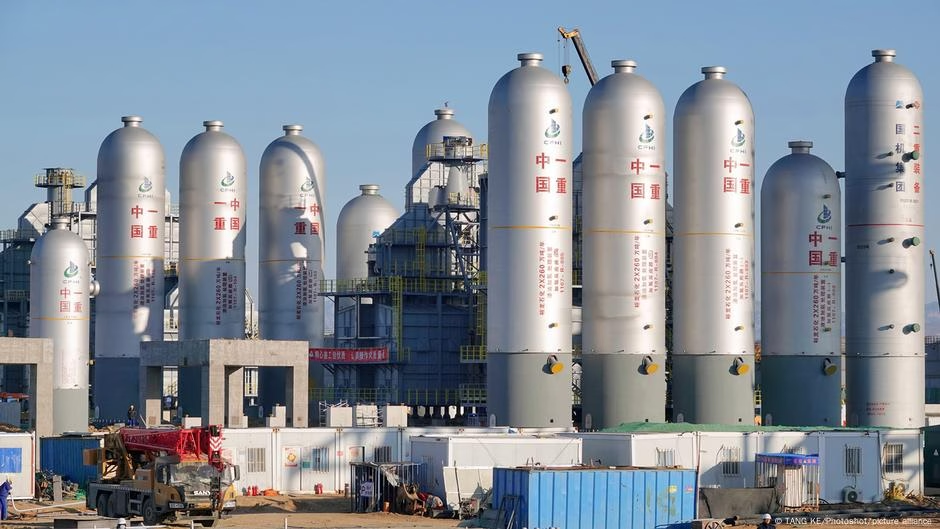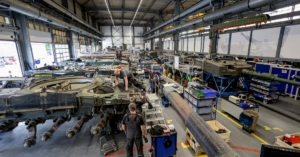Moscow’s full-scale invasion of Ukraine forced Germany to reduce its reliance on Russian oil and gas, sending energy prices soaring and severely hurting industrial sectors like chemicals and steel. Additionally, post-pandemic supply chain disruptions reduced demand for German exports.
Another major factor is China’s speedy shift from low-value manufacturing to high-tech and innovative industries, driven by the Communist Party’s so-called Made in China 2025 strategy, which aims to achieve global leadership in advanced manufacturing and technology.
Germany suffers as China moves up value chain
While Germany was largely unaffected by China’s initial growth spurt in the early 2000s, which focused on low-tech electronics, household appliances, and textiles, Beijing’s industrial policy has since zeroed in on Germany’s core sectors, including automotive, clean technology, and mechanical engineering.
“China has caught up in several advanced industries … they are very strong in these areas … and that is contributing to Germany’s poor growth performance,” said Holger Görg, head of the International Trade and Investment research group at the German Institute for the World Economy (IfW-Kiel), told DW.
The speed at which China has caught up with Germany is perhaps most evident in the auto industry. German carmakers have been criticized for a lack of innovation and a slow transition to electric vehicles (EVs) and not predicting fierce competition from Chinese brands like SAIC Motor and BYD. Those issues have led to threats of tens of thousands of layoffs and domestic plant closures.
German chemicals, engineering sectors under pressure
There has been less awareness, however, of China’s growing threat in other economic sectors. Chinese chemical giants, for example, have significantly increased their output in recent years, particularly in polyethylene and polypropylene, leading to a global oversupply that has driven down the profit margins of German producers like BASF.
Even in the European Union, a key market for Germany, China grew its share of chemicals exports in the decade to 2023 by 60%, while Germany’s share fell by more than 14%, according to data from the Handelsblatt Research Institute.
Germany’s mechanical engineering sector, known for its precision and quality, is also facing stiff competition from Chinese rivals. While Germany’s market share of industrial machinery exports declined slightly to 15.2% from 2013 to 2023, China’s share grew by more than half (from 14.3% to 22.1%)
Subsidies give Chinese firms unfair advantage
Compounding this challenge is China’s policy of heavily subsidizing key industries, which allows Chinese manufacturers to produce at a scale and cost that Western companies struggle to match.
A conservative estimate found that China’s industrial subsidies in 2019 amounted to around €221 billion ($242 billion). A 2022 report by the International Monetary Fund (IMF) found that the majority of Beijing’s subsidies targeted the chemicals, machinery, automotive, and metals industries.
Was Berlin blind to China’s ambitions?
Brad Setser, co-author of the CER report, told DW that China’s high-end exports “didn’t develop overnight.”
“How can German industry survive the second China shock? Why haven’t Germany’s previous governments seen this and done more to adjust policy?” he said.
Now at a historic crossroads, economists warn that Germany must either adapt its trade, industrial and fiscal policies to the new economic reality or risk losing its position as a global manufacturing leader.
Tariffs could force China to pivot to domestic growth
The CER report called on Germany’s next government — a likely coalition of the conservative CDU/CSU alliance and the center-left Social Democrats (SPD) — to pressure China to increase domestic consumption rather than relying mostly on imports for growth.
The study’s authors also highlighted the need to exploit EU trade defenses to hike tariffs on heavily subsidized Chinese exports, including EVs and wind turbines.
Germany needs ‘mindset shift’
Serden Ozcan, chair of innovation and corporate transformation at the Düsseldorf-based WHU — Otto Beisheim School of Management, believes politicians and businesses leaders need to adopt a major “cultural mindset shift” to deal with the rapid pace of change.
Ozcan criticized what he sees as Germany’s “fear of aggressive competition” and an obsession with “overprotecting failure,” where Berlin sometimes provides excessive support to companies that are no longer competitive.
Germany still has many strengths
“Germany is very good at knowledge generation — through research and development (R&D), patents, etc… — and then selling on this knowledge. This is where Germany still has a leading edge and we should keep building on it,” said Görg.
Ozcan, meanwhile, thinks a new generation of CEOs better understand the issues facing German industry than the current cohort and will be able to adapt more quickly.
He gave the example of Christian Klein, the 44-year-old CEO of enterprise software giant SAP, who helped grow the firm’s market value by almost 70% by being an early adopter of artificial intelligence (AI).
“A carmaker is no longer competing with other carmakers. They’re competing with Tencent, a video game company,” Ozcan explained, referring to the Chinese firm’s foray into the technology that drives EVs. “In the future, it will be AI firms that design cures for cancer, rather than pharmaceutical giants.”
Edited by: Uwe Hessler







